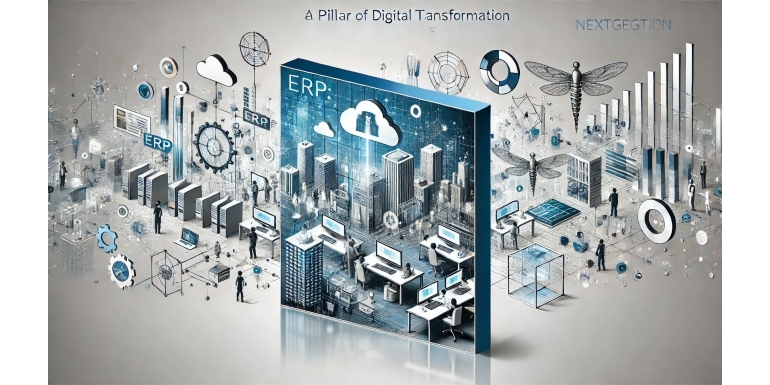
ERP: A Pillar of Digital Transformation for Businesses
In an increasingly digitalized world, digital transformation for businesses is no longer an option but a necessity. Enterprise Resource Planning (ERP) systems play a central role in this transition. They are not just management tools but also levers for performance and competitiveness. This article explores why ERP has become an essential pillar of digital transformation and how it can propel businesses towards success.
What is an ERP?
ERP is an integrated software that manages all of a company's operational processes by unifying different departments within a single platform. This includes managing finance, human resources, procurement, inventory, sales, production, and more. Through a centralized database, ERP provides a consistent and real-time overview of all company operations.
ERP at the Heart of Digital Transformation
-
Integration and Centralization of Data
- One of the main strengths of ERP is its ability to integrate all company functions into a single system. This eliminates information silos, enables better collaboration between departments, and ensures that all data is consistent and accessible in real-time. This centralization is crucial for quick and informed decision-making, which is essential in a digital environment.
-
Improvement of Operational Efficiency
- By automating many manual processes, ERP reduces human errors and increases operational efficiency. For example, ERP systems can automate inventory management, invoicing, production planning, and human resource management, freeing up time to focus on higher value-added tasks.
-
Adaptability and Flexibility
- Modern ERPs are highly configurable and can be tailored to meet the specific needs of each business. This flexibility allows companies to quickly adapt to market changes, new regulations, or new opportunities, which is a significant advantage in an ever-evolving digital environment.
-
Real-Time Access and Mobility
- With the rise of cloud computing, many ERP systems are now available as cloud services (ERP SaaS). This allows employees to access company information in real-time, wherever they are. This mobility is a major asset in digital transformation, particularly for sales teams, customer service, and field operations.
-
Data Security
- Data security is a major concern in digital transformation. ERP systems incorporate robust security measures to protect sensitive company information from cyber threats. Additionally, data centralization facilitates compliance with data protection regulations such as GDPR.
-
Advanced Analysis and Reporting
- ERP offers real-time analysis and reporting capabilities that allow businesses to monitor performance, identify trends, and make decisions based on accurate data. By integrating with Business Intelligence (BI) tools, companies can turn their data into actionable insights, enhancing their strategic agility.
Why ERP is Essential for Today's Businesses
In a world where speed, efficiency, and innovation are key success factors, ERP is positioned as an indispensable tool. It not only supports daily operations but also becomes a driver of growth and transformation. Businesses that adopt ERP can not only improve their productivity but also position themselves more competitively in the global market.
Conclusion
Digital transformation is a major challenge for businesses, but it is also an opportunity to innovate and stand out. ERP plays a central role in this transformation by enabling integrated, efficient, and secure management of operations. For businesses looking to thrive in the digital age, investing in ERP is no longer a luxury but a strategic necessity.
If you are considering embarking on your digital transformation, implementing an ERP could be the first step towards a more agile, efficient, and competitive organization. Explore the different options available on the market and choose an ERP system that best fits your specific needs.
